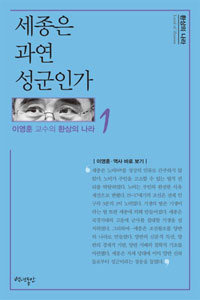The ‘good and wise’ King Sejong gets reinterpreted
The ‘good and wise’ King Sejong gets reinterpreted
Posted March. 24, 2018 08:13,
Updated March. 24, 2018 08:13

When you ask South Koreans to pick a historical figure they admire the most, the first or second place goes to King Sejong. This is because he created Korean alphabet Hangeul and laid the foundation of the Joseon Dynasty by organizing various political and social systems. The author, however, who is an economist, raises a doubt on whether Sejong is good and wise king. This book “Is Sejong Truly a Great King?” is trying to point out that King Sejong also has aspects that are not so admirable when you take a close look into the reality at that time.
Author Lee Yeong-hoon, former economics professor at Seoul National University, has three grounds to criticize King Sejong – the expansion of slavery, spread of gisaeng (Korean geisha) and reinforcement of toadyism. First of all, Lee analyzed that the expansion of slavery was a result of King Sejong’s policy that made more slavery inevitable for the benefit of aristocrats. A case in point is increasing number of slaves by legislating the “Act Regarding the Slave Mother’s Child,” which regulates a child born under a male who is not a slave and a slave woman as a slave.
This goes the same with the spread of the gisaeng system. King Sejong, in 1431, accepted the Justice Ministry’s proposal to have daughter born to a maidservant of the government and a non-slave man as a gisaeng and son as a male slave of the government. Lee interpreted King Sejong to be an old-fashioned monarch who only sought the convenience of aristocrats rather than the human rights as he made orders to deploy gisaengs to comfort the military in border area in 1437.
Moreover, this book criticizes King Sejong for his toadyism that substantially subordinated Joseon to China by getting rid of holding rites to the sky. The author also depreciated King Sejong’s creation of Hangeul as an invention only to mark the pronunciation of Chinese characters more precisely.
This kind of analysis is conspicuously different from the previous interpretation by historians. The author may be conscious of the fact that there are many provocative contents. He leaves room to accept any criticism that may arise on the book with an open mind.
Jin-Hup Song jinhup@donga.com
Headline News
- N. Korea launches cyberattacks on S. Korea's defense companies
- Major university hospital professors consider a day off each week
- Italy suffers from fiscal deficits from ‘Super Bonus’ scheme
- Inter Milan secures 20th Serie A title, surpassing AC Milan
- Ruling and opposition prioritize spending amid tax revenue shortfalls







